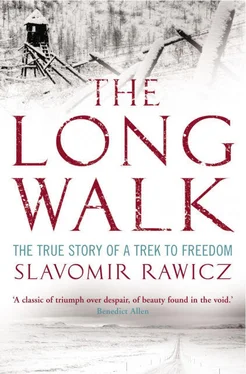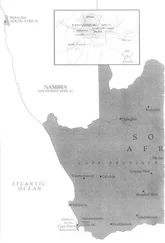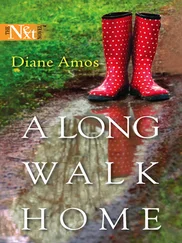We knew we should have to spend the night in this rarefied atmosphere and the knowledge did our spirits no good.
‘We must keep going while there’s light,’ Zaro said. ‘We must try to get over the top before dark.’
So we went on and on, painfully, like flies struggling through a pool of treacle. We made long traverses to right and left to avoid the impossible extra exertion of a frontal assault. I do not remember going over the summit. I remember only the point at which I noticed with vague surprise that Zaro, leading, was slightly below me. We climbed again a little and then we knew with certainty the descent had begun.
That night was the crisis of the whole enterprise. On a broad, flat ledge where the snow had drifted and piled, we axed through the hard crust of the surface and dug laboriously through a few feet of snow to make ourselves a barely adequate refuge against the rigours of the night. We had no fire. We were so bone-weary we could have slept literally standing up, but we knew it would be courting death even to attempt to doze.
It was the longest night of my life. We huddled there standing, with our arms about one another. Sleep lay on our lids like a solid weight and I found myself holding my eyes open with fingertips pressed against the eyeballs under my mask. Three times Kolemenos, the arch-sleeper, let his chin sag on his chest and began to snore, and each time we punched and shook him back to consciousness. Each man was his brother’s keeper, watching for drooping eyelids and the nodding head. At intervals we would stamp slowly around in a close ring. Even during this grotesque dance I began to swim down into beautiful, velvet sleep, but the American dragged me back by gently cuffing me, pulling my beard and shaking me. There came that awful pre-dawn period when fatigue and cold together combined to set me shivering in an uncontrollable ague from head to foot.
‘Let’s get going,’ said someone. ‘Let’s get down to some place where we can breathe again.’
Paluchowicz spoke. ‘I could not last another night like that.’ He was voicing the thought of us all.
It was barely light, but we broke out and started on our way, Paluchowicz leading and Zaro and I in the rear. Even now I could not convince myself we would make it. Once, around noon, we were marooned for fully an hour when the track of our descent ended abruptly on a foot-wide shelf over a terrible drop. We inched our way back, climbed upwards in our old tracks and tried again in another direction. This time we succeeded, but not without great danger and frequent use of the rope and axe.
In about ten hours of gruelling toil we must have come down about five thousand feet before nightfall. Breathing became easier, morale improved, hopes rose a little again. We dragged on through another depressing, wakeful night and continued the descent the next day until we were able to see the valley below quite clearly.
In the afternoon Zaro said to me, ‘Do you notice anything peculiar about this valley?’
I looked around. ‘No,’ I answered. ‘Why?’
Zaro pointed to a long ridge thrown out from the main body of the mountain away to the west. ‘It is a similar formation to the ridge in which we found the shepherd’s cave.’
I laughed. ‘You don’t think we shall meet another shepherd and his flock?’
‘No,’ said Zaro. ‘But we might find a cave in which we can get a night’s sleep.’
We called the others over and suggested swinging away down the ridge to look for a cave. They agreed readily.
The extraordinary feature of this venture was not that, after a couple of hours search, we found a cave. But the cave was indeed a herdsman’s winter retreat. Unlike the other, it was untenanted, but there was a stack of brushwood near the entrance and a cached pile of untreated fleeces against the wall at the back, about twelve feet in from the opening. If we had needed a sign that Providence was still on our side, this was it.
Hanging from a peg in the roof was something parcelled in soft lambskin. Someone lifted it down and unwrapped it. Inside was a leg of goatmeat, partly smoked and nearly black. We were too hungry to be fastidious. We decided to get the fire going and cook it.
What a fire that was. We stoked it up until the dancing flames lit up the far corners of the cave. Watching the meat cooking, we thawed out for the first time for weeks. Without the knife we had to do some crude carving with the axe, leaving half the joint to be eaten in the morning and tearing up the rest in strips. Toothless Paluchowicz, without the knife to help him, took longer than the rest of us to eat his portion, but we all managed to take the edge off our hunger.
In this cave, for the only time since we left Siberia, we helped ourselves to another man’s belongings. We broke out fleeces from the cache and made ourselves a sleeveless surcoat each. For this I hope we may be forgiven, but our need was great for something which would keep away the mountain cold from our hard-used bodies. We slept the night through in a great communal bed of warm, smelly sheepskins, and when we awoke the day was already a couple of hours old and the fire had long since died out. Hurriedly we replaced the skins which had made the bed, ate the rest of the goatmeat cold, and left.
It was profitless to speculate any further on how near we might be to our journey’s end. Not even now were we out of the mountains. The lesser peak we set ourselves to surmount two days after the cave episode was, had we known it, the last outpost of the Himalayas, beyond which the foothills led down into Northern India. I do not remember any of the details of this last climb, but I know we pulled ourselves up the northern face for two days without attaining the height that induced altitude sickness. When we started down the other side the sun was shining and the air was startlingly clear. Far off to the west I could see snow-covered giants which made a modest hill of the eminence on which I stood. Southward the country fell away dramatically. I knew I was looking at India.
In all our wanderings through the Himalayan region we had encountered no other creatures than man, dogs and sheep. It was with quickening interest, therefore, that in the early stages of our descent of this last mountain Kolemenos drew our attention to two moving black specks against the snow about a quarter of a mile below us. We thought of animals and immediately of food, but as we set off down to investigate we had no great hopes that they would await our arrival. The contours of the mountain temporarily hid them from view as we approached nearer, but when we halted on the edge of a bluff we found they were still there, twelve feet or so below us and about a hundred yards away.
Two points struck me immediately. They were enormous and they walked on their hind legs. The picture is clear in my mind, fixed there indelibly by a solid two hours of observation. We just could not believe what we saw at first, so we stayed to watch. Somebody talked about dropping down to their level to get a close-up view.
Zaro said, ‘They look strong enough to eat us.’ We stayed where we were. We weren’t too sure of unknown creatures which refused to run away at the approach of men.
I set myself to estimating their height on the basis of my military training for artillery observation. They could not have been much less than eight feet tall. One was a few inches taller than the other, in the relation of the average man to the average woman. They were shuffling quietly round on a flattish shelf which formed part of the obvious route for us to continue our descent. We thought that if we waited long enough they would go away and leave the way clear for us. It was obvious they had seen us, and it was equally apparent they had no fear of us.
Читать дальше






![Джеффри Арчер - The Short, the Long and the Tall [С иллюстрациями]](/books/388600/dzheffri-archer-the-short-the-long-and-the-tall-s-thumb.webp)





